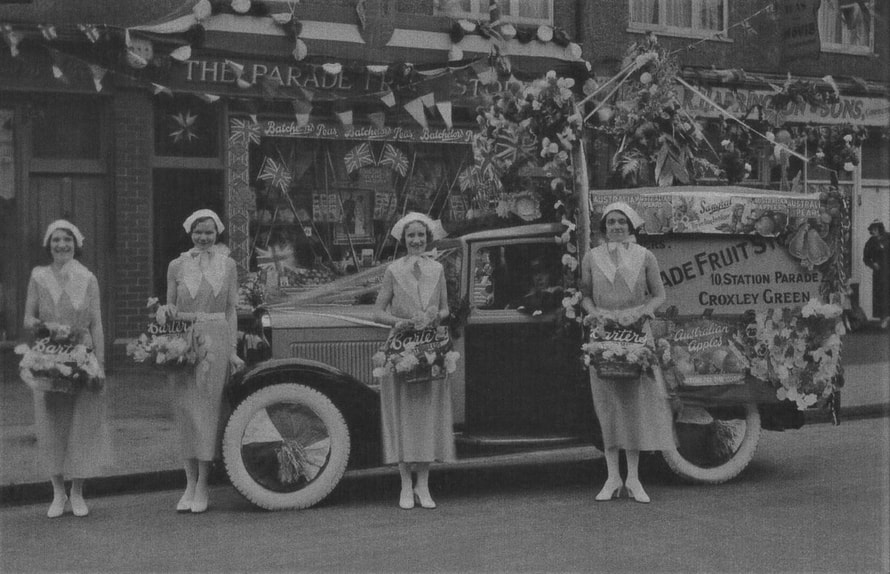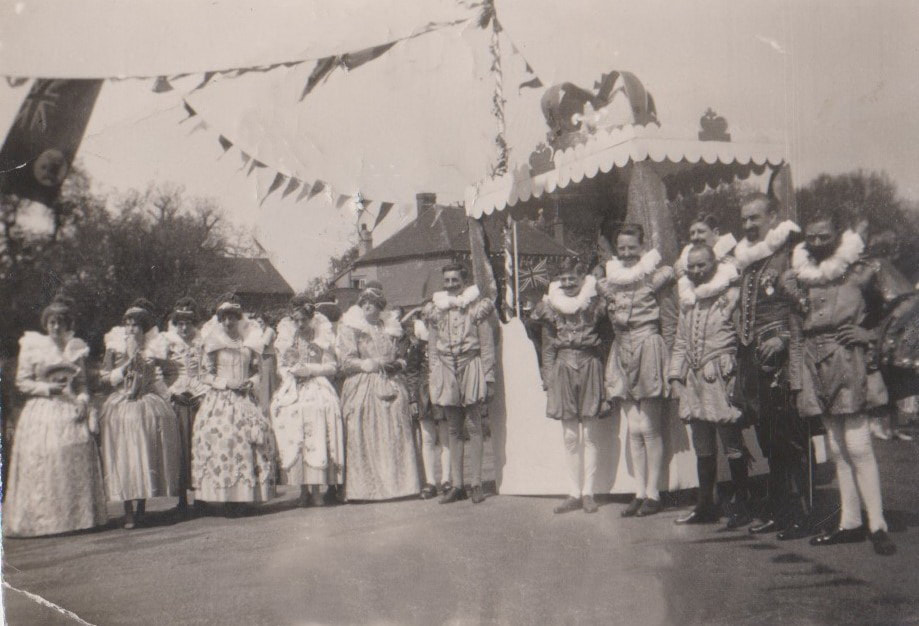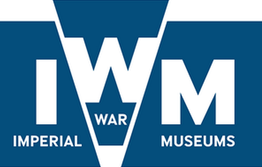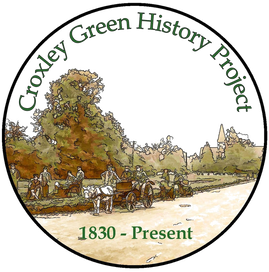Brian Drury - Memories of Croxley Green
Recorded 31st August 2022
Recorded 31st August 2022
We’re here with Brian, who has been a long-time resident of Croxley Green.
So you were born in Watford but your family lived in CG?
BD: Yes
So you’ve been in Croxley since the 1940s?
BD: Well 1938. We lived over the shop, you see.
Ah. Which shop was that?
BD: Greengrocer’s
In New Road?
BD: No, along the Parade
What was the name of the grocer’s?
BD: Parade Fruit Stores
There were two addresses then. 10 Station Parade or 142 Watford Road.
And your parents owned the shop?
BD: I got the feeling he [Amos Stanley Drury] rented it. But we had the land behind the shop…where they’ve built those flats there now…like an orchard
And where did your Dad source all the fruit and vegetables?
BD: They delivered to us
And how long did he have the shop for?
BD: About the 1920s
And growing up over the shop, did you end up helping in the shop?
BD: When I was allowed to. You see, when I was that age, the War was on and everything was rationed. You had to have a ration book to get oranges and things like this.
And do you remember what it was like?
BD: I can remember having a blue covered ration book and the adults’ was brown, or fawn coloured
They took coupons out. Each one had a date and a number on it and you just cut it out.
And where did you go to school?
So you were born in Watford but your family lived in CG?
BD: Yes
So you’ve been in Croxley since the 1940s?
BD: Well 1938. We lived over the shop, you see.
Ah. Which shop was that?
BD: Greengrocer’s
In New Road?
BD: No, along the Parade
What was the name of the grocer’s?
BD: Parade Fruit Stores
There were two addresses then. 10 Station Parade or 142 Watford Road.
And your parents owned the shop?
BD: I got the feeling he [Amos Stanley Drury] rented it. But we had the land behind the shop…where they’ve built those flats there now…like an orchard
And where did your Dad source all the fruit and vegetables?
BD: They delivered to us
And how long did he have the shop for?
BD: About the 1920s
And growing up over the shop, did you end up helping in the shop?
BD: When I was allowed to. You see, when I was that age, the War was on and everything was rationed. You had to have a ration book to get oranges and things like this.
And do you remember what it was like?
BD: I can remember having a blue covered ration book and the adults’ was brown, or fawn coloured
They took coupons out. Each one had a date and a number on it and you just cut it out.
And where did you go to school?
BD: First of all I went to Yorke Road. That was in the war. Then I went to the Old Boys’ school, which was the one round the corner from there. Then from there to Harvey Road, which was then wooden shacks, wooden huts and that and then to Durrants.
And which of those schools do you remember most fondly?
BD: Well. . Harvey Road. It was good there. I was very keen on natural history. And there was a Miss Ayles there and she took an interest. On Saturday afternoons we used to go for nature walks.
So that would have been outside normal school hours? And the teacher organised that for you?
BD: Yes. Miss Ayles
Was she your favourite teacher there at the time?
BD: Yes, she was good. Then there was Mrs Fenton. She was always singing. She sang “Blow away the morning dew” and all these types of songs, country songs. She was Welsh.
And which of those schools do you remember most fondly?
BD: Well. . Harvey Road. It was good there. I was very keen on natural history. And there was a Miss Ayles there and she took an interest. On Saturday afternoons we used to go for nature walks.
So that would have been outside normal school hours? And the teacher organised that for you?
BD: Yes. Miss Ayles
Was she your favourite teacher there at the time?
BD: Yes, she was good. Then there was Mrs Fenton. She was always singing. She sang “Blow away the morning dew” and all these types of songs, country songs. She was Welsh.
And that would have been the late 40s?
BD: Yes. Do you know the Amethyst? Got trapped in a river in China. I was there at Harvey Road then. Must have been about 1948/49. Got out by the Chinese communists.
And do you remember what sort of subjects you did at Harvey Road then?
BD: …The worst thing was nearly every day we had to sit down for English and they had these books and I can always remember one of them “the first flight over Everest”. The first person had to start reading and the next person, so you had to follow it all the way through in case it came to your turn!
So were you excited to go to Durrants?
BD: Yes. I didn’t mind Durrants at all. ………to go to Watford Grammar. Everybody done to do a test…. I suppose it was the 11+. Strange questions. Some of them were catch questions. I always remember one.. the train steam train is going so many miles an hour, and there’s another train coming so many miles an hour, what direction does the smoke go on? Well I got that wrong. It was two electric trains, so the answer was electric trains don’t have smoke!
So you went on to Durrants. What were your favourite subjects?
BD: Natural History and Sciences.
And when did you leave school?
BD: 14 I was. The reason being I was (born on) 6th August. If I’d been a week younger I’d have had to go on till Christmas.
What did you like doing in your free time?
BD: Natural history, model making
Where did you go on your nature walks?
BD: Down to the canal, is it Lock Mead? Then through Sansom’s fields, through the woods, up into Chenies, along the Chess. You had to be really keen on it.
BD: I was just observing. They used to emphasise no collecting eggs.
That teacher really inspired you. Was walking a hobby you carried on as an adult?
BD: Yes. We have a pond in the garden now. Newts and everything, but we have trouble with the heron.
And you used to fly your planes down the Moor? Where did you buy your modelling kit?
BD: Well by Croxley Met station there was a bit of spare ground where a house had a bomb on it and they put a wooden hut on it and they sold modelling kit.
Were there a lot of boys who did that?
BD: Not exactly boys. Grown -ups! Some of them had radio controls. They used to make diesel engines.
So that was every Sunday afternoon. Used to go to the Methodist church and then up there afterwards. That’s the one in New Road.
Did you belong to the Methodist Church from when you were small?
BD: All my family were Methodists. My grandfather on my mother’s side was a caretaker or something. My mother used to play the organ up there before the war.
And was she from Croxley?
BD: They all lived on New Road
So you left school at 14.. what did you do then?
BD: Well I worked in the shop, pottered around the shop. It was quite a big shop actually. One of my jobs was the rabbits and chickens.
Did you sell them in the shop?
BD: No we had to go to the butcher’s.
So you bred the animals to sell to the butcher?
BD: We never got egg rations cos we had chickens. We got so much corn allowance as well.
After the war we used to follow behind the tractors picking up the ears of corn after they’d cut for the chickens because Dad knew the Fosters at Killingdown and we knew the Sansoms, the watercress people. They used to bring the boxes of watercress up and then people from Northampton used to pick it up from us. They delivered potatoes and carrots. It was like a drop off type thing. I think they gave us money to give to the watercress people. I used to get told off. Nowadays you can’t do it. They used to get the watercress in boxes and you could move it to the side and find sticklebacks and creepy crawlies and freshwater shrimps and all that.
What did you do with them all?
BD: We had aquariums. We had chicken houses at the back of the shop. In the orchard we had a stable for coal and space for two vans. We got our first new van in about 1949 I think.
During the war were you still going out with a horse and cart?
BD: No. We never had nothing like that. People had to come and pick it up if they wanted it! But once we got the van we [did] Saturday deliveries. My Dad went round on a horse and cart before the war, before I was born.
So this is a beautiful picture of the shop all done up with flags. What was the occasion?
BD: Yes. The person sitting in the car was my Dad’s brother. My bedroom was the window above the shop. I don’t know if it was the coronation of King George VI ….
After the war I had to sit there and cut out all the Russian flags! That bunting they used to put round. It had American and British and Russian flags
So you had a celebration at the end of the war at the shop?
BD: Yes and one for the Festival of Britain in the 1950s. And the Frankland Road street party after the war.
(Brian then speaks about his National Service and 13 years in the Army in Malaysia and Germany.
He moved back to Croxley and bought his present home in 1974)
Why did you come back?
BD: The price. I did Save as you Serve. This place was about 19k.
So even though the house cost more you still came back to Croxley? Why was that?
BD: I knew everybody.
How long have your family been in Croxley?
BD: So Dad had the shop. And at the top of Scot’s Hill where the bomb came down, by Revell’s, they had a laundry. My grandmother had a laundry there.
(Brian then alluded to some of the family scandals surrounding his grandfather, who had been convicted for horse rustling but also made it into the Watford Observer for finding a body on Tolpits Lane!)
So what are your fondest memories of Croxley?
BD: It was green in them days. Too many cars now. Everybody’s got a car in their garden. You used to go along the roads and there’d be privet hedges and that. Up by Durrants school, built before the war, they built pre-fabs at Grove Crescent.
Did you walk to school?
BD: I couldn’t ride my bike up there. They didn’t have room for bikes. It was packed up there. When William Penn opened up my cousins who lived in Mill End were transferred from Harvey Road down to William Penn.
So in those early years there were a lot of children at Harvey Road?
BD: So it was only wooden huts. There was no canteen, nothing. They started building a canteen while I was there.
Did you used to come home for lunch?
BD: Yes. Do you want to know the names of the shops on the parade? Starting by the station, the one on the corner was a bicycle shop. Then it was the Goodson’s the newsagent, then it was Chater’s the chemist. Then there was an open space there and they built a prefabricated post office. Next to that was a fish and chip shop. Still there. Then Karbaron’s, the cleaner’s, Milly’s electrical, I think there was a bit of a library there as well. Then it was a hairdresser’s which was made into a café. Then it was our shop [Parade Fruit Stores], then Harrington’s, the bakers. Next to Harrington’s was Cole’s, which was a draper’s shop. Their son was killed in a bombing raid over Berlin or somewhere. All the family are in Ricky cemetery. Then there was Hedges. I think it was Halliwell’s before that. Then there was a gap which goes down to our orchard. You could go down there to there to the garages and stables. Then it was Darvill’s the butcher. Then there was another gap and then there were two houses which as far as I can remember were police houses.
And with two grocers on the street- your Dad and Hedges- was there a lot of competition?
BD: We weren’t allowed to sell eggs or anything like that and they weren’t allowed to sell cabbages!
And the Red House was opposite. There was another little shop opposite and they used to sell orange drink, for children. The wartime one.
Up New Road there was a cobbler’s shop and Palmer’s and opposite that was the Busy Bee and another baker’s shop. You went up a bit further, you had Wright’s on the right and the shops there which have now been converted into houses. And Cheshire’s, a grocers. You used to get tins of sausages there. Then you carried on up. Barton way. On the corner my uncle used to sell fish from his garden at 181 New Road. Opposite you had the Guildhouse and then you had another road there, Dickinson’s and then the Co-op and a small post office there as well. Opposite you had Bryant’s the grocer’s, Gadsden’s the butcher’s and then a shop where you could get fishing tackle. Then you had Durrant’s for clocks. They used to do All Saints’ church clock. Then there was another newsagents.
Then further up the road you had the blacksmith’s- there’s a garage there now and then a hairdresser’s next to the garage. Then you had Tussaud’s and the Methodist church. And you had another grocers on the corner of Yorke Road. Element’s was on the other side. My grandfather Grace lived almost opposite the blacksmith’s. Then you had the Tussaud house. Then you come to the top of the road.
Did your Mum use to mostly shop in the village?
BD: Yes because all the shops in Baldwin’s Lane were built after the war.
So, you didn’t go to Watford very often?
BD: Very rarely. The only time we went to Watford was to Cawdells and we did go to Clements. We went to Cawdells, especially at Christmas time. They had a zoo! You went in the back entrance along the arcade and through the back door of Cawdells was like a couple of tigers or a lion in a cage. At Christmastime. It’s in the Watford Observer that is, I think. Otherwise, I didn’t go to Watford hardly at all. Or we went down Queen’s Road to Trewins.
Oh, so Trewins used to be on Queen’s Road?
BD: By the Methodist Church. That got pulled down.
Did you belong to youth clubs at the Methodist church?
BD: Only the one on New Road… snooker, country dancing.. but most of it was older people. The younger ones got pushed out more. We used to go on Sunday school outings as well.. Bognor, Clacton. We used to get the coach about six or seven o’clock in the morning. You knew everybody on your coach. About six or seven coaches went.
Had the shops changed a lot by the 70s?
BD: I didn’t recognise it really! A lot of cafes. Nowadays everyone has a car, you see. A lot of people used to go down to Ricky Tesco’s.
Did you have a car?
BD: No. We didn’t have a television either. I’ve never had a car. Can’t drive.
I used to work in the vaults at Securicor in North Watford. It closed down recently. I used to cycle there. It’s not far. I was there 30 odd years.
And what changes have you noticed in the last 10 or 15 years?
BD: They’ve built a lot up. Repton Way was all fields there. The pre-fabs were gone or going when I came back and they built Grove Crescent.
Do you remember what health care was like in the village?
BD: They did make house calls. The doctor got injured in the War.
And what about the Revels?
BD: We have hundreds of pictures of the Revels.
(Brian chats about his son’s education and how he liked taking photos at the Revels and his love of gardening and natural history and more about his time in Malaya and Aden and Kenya in the 60s)
BD: There used to be a pond at Durrants with newts in it- great-crested ones.
Has Croxley always felt like a safe place to you?
BD: Yes. You know the place. (Brian chats about his return to London and how he used to meet up with other ex -servicemen. There was also a friend in Links Way who had been at the liberation of Belsen.)
What has Croxley meant for you in your lifetime?
BD: Peace. Peace and quiet. ….
A lot of the people I’ve known have gone.
And with two grocers on the street- your Dad and Hedges- was there a lot of competition?
BD: We weren’t allowed to sell eggs or anything like that and they weren’t allowed to sell cabbages!
And the Red House was opposite. There was another little shop opposite and they used to sell orange drink, for children. The wartime one.
Up New Road there was a cobbler’s shop and Palmer’s and opposite that was the Busy Bee and another baker’s shop. You went up a bit further, you had Wright’s on the right and the shops there which have now been converted into houses. And Cheshire’s, a grocers. You used to get tins of sausages there. Then you carried on up. Barton way. On the corner my uncle used to sell fish from his garden at 181 New Road. Opposite you had the Guildhouse and then you had another road there, Dickinson’s and then the Co-op and a small post office there as well. Opposite you had Bryant’s the grocer’s, Gadsden’s the butcher’s and then a shop where you could get fishing tackle. Then you had Durrant’s for clocks. They used to do All Saints’ church clock. Then there was another newsagents.
Then further up the road you had the blacksmith’s- there’s a garage there now and then a hairdresser’s next to the garage. Then you had Tussaud’s and the Methodist church. And you had another grocers on the corner of Yorke Road. Element’s was on the other side. My grandfather Grace lived almost opposite the blacksmith’s. Then you had the Tussaud house. Then you come to the top of the road.
Did your Mum use to mostly shop in the village?
BD: Yes because all the shops in Baldwin’s Lane were built after the war.
So, you didn’t go to Watford very often?
BD: Very rarely. The only time we went to Watford was to Cawdells and we did go to Clements. We went to Cawdells, especially at Christmas time. They had a zoo! You went in the back entrance along the arcade and through the back door of Cawdells was like a couple of tigers or a lion in a cage. At Christmastime. It’s in the Watford Observer that is, I think. Otherwise, I didn’t go to Watford hardly at all. Or we went down Queen’s Road to Trewins.
Oh, so Trewins used to be on Queen’s Road?
BD: By the Methodist Church. That got pulled down.
Did you belong to youth clubs at the Methodist church?
BD: Only the one on New Road… snooker, country dancing.. but most of it was older people. The younger ones got pushed out more. We used to go on Sunday school outings as well.. Bognor, Clacton. We used to get the coach about six or seven o’clock in the morning. You knew everybody on your coach. About six or seven coaches went.
Had the shops changed a lot by the 70s?
BD: I didn’t recognise it really! A lot of cafes. Nowadays everyone has a car, you see. A lot of people used to go down to Ricky Tesco’s.
Did you have a car?
BD: No. We didn’t have a television either. I’ve never had a car. Can’t drive.
I used to work in the vaults at Securicor in North Watford. It closed down recently. I used to cycle there. It’s not far. I was there 30 odd years.
And what changes have you noticed in the last 10 or 15 years?
BD: They’ve built a lot up. Repton Way was all fields there. The pre-fabs were gone or going when I came back and they built Grove Crescent.
Do you remember what health care was like in the village?
BD: They did make house calls. The doctor got injured in the War.
And what about the Revels?
BD: We have hundreds of pictures of the Revels.
(Brian chats about his son’s education and how he liked taking photos at the Revels and his love of gardening and natural history and more about his time in Malaya and Aden and Kenya in the 60s)
BD: There used to be a pond at Durrants with newts in it- great-crested ones.
Has Croxley always felt like a safe place to you?
BD: Yes. You know the place. (Brian chats about his return to London and how he used to meet up with other ex -servicemen. There was also a friend in Links Way who had been at the liberation of Belsen.)
What has Croxley meant for you in your lifetime?
BD: Peace. Peace and quiet. ….
A lot of the people I’ve known have gone.




